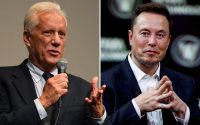Google CEO Sundar Pichai grilled over company’s deleted chat logs at antitrust trial
Google CEO Sundar Pichai was grilled Monday about the company’s attempts to keep internal chat logs private during his widely anticipated appearance on the witness stand at the landmark federal antitrust trial.
Justice Department attorneys pressed Pichai to explain his handling of now-infamous internal group chat from 2021, in which he asked a Google employee to “change the setting of this group to history off.”
Nine seconds later, Pichai attempted to delete the request, as The Post previously reported.
Pichai downplayed his actions, telling the court he only requested history be turned off in that instance so that he could discuss confidential details about an upcoming Google Cloud event — and “very rarely” does so in general.
“This is not even close, remotely, to anything covered by this litigation,” Pichai said of the chat, according to Bloomberg. “I take great care to comply with all litigation holds. I never use chat to have substantial discussions on material topics.”
Pichai was the most high-profile witness to date in the Google antitrust trial, where the feds have accused the Big Tech giant of spending billions of dollars per year – including more than $26 billion in 2021 – to maintain its search engine as the default setting on most devices and build an illegal monopoly over online search.
During his opening statement, DOJ attorney Ken Dintzer alleged that Google had “destroyed documents for years because they knew their conduct violated the antitrust laws.”
In a previous court filing from February, the DOJ had slammed Google over revelations that it automatically destroyed employee messages after 24 hours.
Pichai told the court that he has since taken action to end that policy.
The automatic deletion policy was first introduced by Google’s chief legal officer Kent Walker in 2008. In an email at the time, Walker noted that “Google continues to be in the midst of several significant legal and regulatory matters, including government review of our deal with Yahoo!”
Pichai acknowledged he had received that email, though he did not become CEO until 2015.
“When I became CEO this is how it worked,” Pichai said.
Pichai also defended Google’s decision to pursue default search engine deals – most notably with Apple – as a necessary move in a highly competitive market during his testimony.
He described internal concerns in 2016 that Apple would begin to send user search queries on its Safari browser to other platforms, such as Amazon, unless Google retained its default status.
When asked about Google’s billions in annual spending on default deals, Pichai acknowledged, “We definitely see value.”
Pichai also jabbed at rival Microsoft, whose CEO Satya Nadella had earlier referred to the notion of consumer choice as “bogus” due to the prevalence of Google’s search engine.
Pichai said the web browser market “had kind of stagnated” when Google first introduced its Chrome browser product in 2008.
“They (Microsoft) were not that incented to improve the browser,” Pichai said, adding that Chrome was a “pretty dramatic improvement” over Microsoft’s browser at the time.
With Post wires


